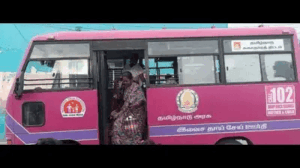Local News
“Expanding Madurai’s 102 Drop-Back Service: A Lifeline for Maternal and Infant Health”
 Madurai’s 102 Drop-Back Service: Expanding Safe Passage for New Mothers
Madurai’s 102 Drop-Back Service: Expanding Safe Passage for New Mothers
Madurai’s public health system has witnessed significant growth in the “102 Drop-Back” service, which ferries new mothers home from government hospitals after delivery. While thousands have benefited from this, healthcare activists and local communities are now urging authorities to broaden the service’s reach — beyond post-delivery transport — to cover pregnant women before delivery and to support infant care and vaccinations.
What is the 102 Drop-Back Service?
The 102 Drop-Back service provides free transportation for new mothers, their newborns, and accompanying attendants from government hospitals to their homes. It is part of the broader emergency medical services in the region, operated by organizations like GVK-EMRI. The goal is to ensure safe, comfortable transit especially for women from remote or underserved areas where transport options are limited.
So far this year, up to August, the service has transported 52,899 new mothers across Madurai and nearby southern districts. In Madurai alone, usage has increased from about 4,375 mothers in Jan-Aug 2024 to 6,383 in the same period in 2025.
This rise highlights both the demand and the trust building among women and their families.
Advantages and Impact
The benefits are substantial:
Reduced travel cost — Many mothers and families save on hiring private transport, which can be costly in remote areas.
Safety and comfort — The service ensures that even through bad roads or difficult terrain, mothers and newborns have a vehicle suited for the journey. Pilots (drivers) assist in boarding and alighting, which helps especially when mobility is low just after delivery.
Geographical reach — The 102 Drop-Back vehicles serve remote villages, ensuring that even those far from medical facilities receive support.
Gaps Identified: What’s Not Yet Covered
Despite its popularity and success, there are several limitations and gaps in the present system:
Limited vehicle numbers: Districts often have just 2–4 vehicles dedicated for the service. With rising demand, this number is insufficient, leading to delays or unavailability.
Waiting times: Many families report that after discharge, waiting for the 102 Drop-Back vehicle can be long, sometimes pushing them to seek private transport.
Scope of service: Currently focused mainly on new mothers post-delivery, the service does not officially cover pregnant women in earlier stages or for newborns’ vaccination trips. Activists argue these are crucial components of maternal and child health.
Awareness & accountability: Some users are unaware of how to access the service, or when they are eligible. The need for better hospital displays, information boards, and grievance systems has been raised.
Voices From the Ground
Health activist C. Anand Raj urged expanding the service to cover infants up to one year for vaccination or health visits. He also suggested giving priority to mothers who are disabled, have medical complications, or are from economically weaker backgrounds.
Attenders and families from villages expressed the wish for advance booking options, or at least clarity about waiting times, so that returning home becomes less stressful post-delivery.
Proposed Improvements & Suggestions
To address these gaps, stakeholders have suggested several enhancements:
Scale up vehicle fleet: Increase the number of Drop-Back vehicles in districts with high birth rates or large rural populations.
Include pre-delivery travel: Expand eligibility so that pregnant women, especially those in remote areas or in final trimester, are also able to use the service to reach health facilities and return home.
Support for infant healthcare: Include transport for newborns’ vaccination visits and follow-ups. This could help improve immunization rates and early detection of health issues.
Advance booking system or scheduling: Introduce an appointment or scheduling system so mothers can request transport ahead of time, reducing uncertainty and wait times.
Visibility and feedback: Hospitals should have visible signage, information boards explaining the service, eligibility, contact numbers; also a mechanism for feedback or complaints to improve responsiveness.
Priority for vulnerable groups: Criteria should favor mothers with special needs, chronic illness, financial constraints, or those living in remote or difficult-to-access localities.
Broader Significance for Public Health
Improving the 102 Drop-Back service aligns with larger public health goals:
It supports maternal health, reducing risks associated with unsafe transport or delayed movement after delivery.
It contributes to infant health, particularly by facilitating timely vaccinations and postnatal checkups.
It addresses equity in access, ensuring that rural or low-income families are not left behind.
It reduces financial burden on families, which can otherwise lead to deferred care or unsafe travel choices.
Conclusion
The 102 Drop-Back service has already made a positive impact in Madurai and its surrounding districts, easing the journey home for tens of thousands of new mothers. Yet, its full potential has not been realized. Expanding scope, increasing vehicle availability, enhancing scheduling and awareness can turn it from a useful support into a comprehensive pillar of maternal and child health in the region. As activists, hospitals, and the public push for these improvements, policymakers have an opportunity to make a tangible difference — ensuring that vulnerable mothers and newborns travel safely, without added stress.



